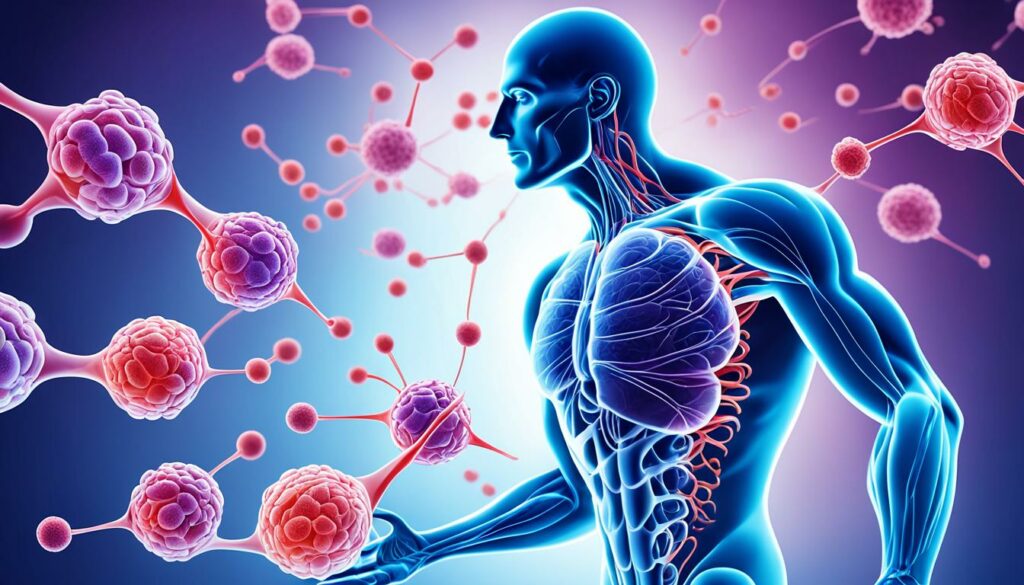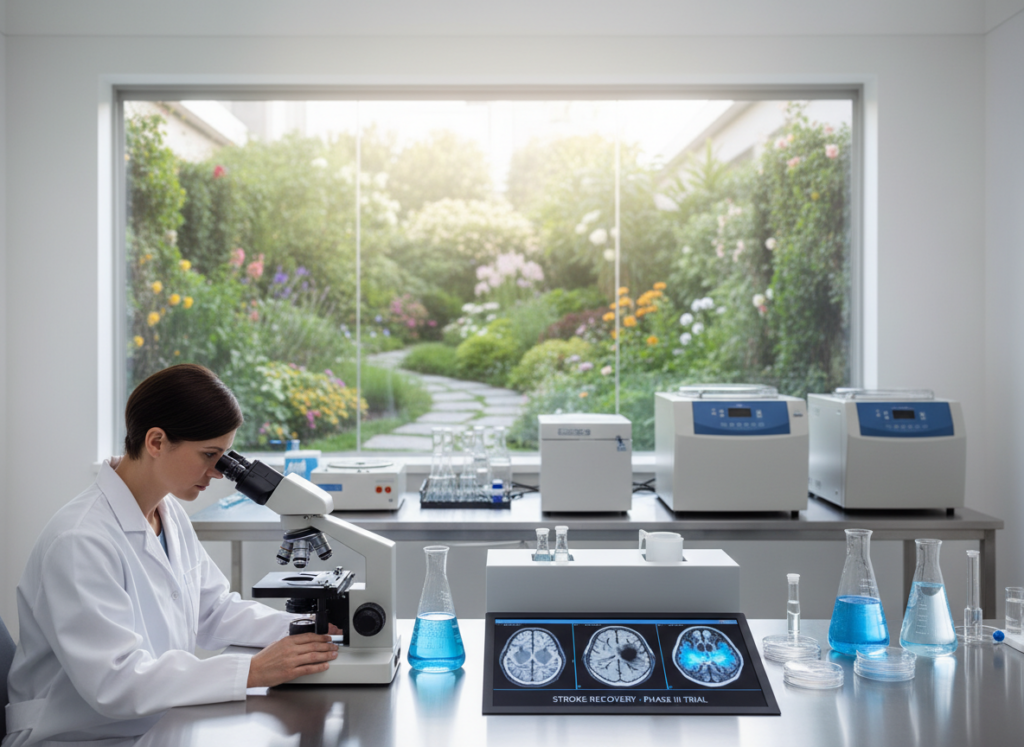Did you know that your body has an incredible defense system that can be supercharged to fight against diseases and infections?
Stem cell therapy offers a groundbreaking solution to strengthen your immune system’s defenses and enhance its ability to protect your body.
Stem cells, the versatile building blocks of the human body, play a crucial role in immune regulation. By understanding the intricate relationship between stem cells and the immune system, scientists have made remarkable advancements in harnessing the therapeutic potential of stem cells to boost the body’s defense mechanisms.
In this article, we will dive into the power of stem cells in immune regulation, explore advancements in stem cell therapy for autoimmune diseases, understand how stem cell transplants can reinforce the body’s defense mechanisms, uncover emerging trends in combating infectious diseases, and reflect on the potential of stem cells to transform medicine.
Key Takeaways:
- Stem cell therapy offers a groundbreaking solution to boost the immune system’s defenses against diseases and infections.
- Stem cells have the remarkable ability to regulate and modulate the immune system, enhancing its functionality.
- Advancements in stem cell therapy show promise in treating autoimmune diseases and managing autoimmune responses.
- Stem cell transplants can reinforce the body’s defense mechanisms by replenishing the immune system.
- Emerging trends in combating infectious diseases involve harnessing the power of stem cells to enhance the body’s natural defense mechanisms.
Understanding the Power of Stem Cells in Immune Regulation
Defining Stem Cells and Their Role in Immunity
Stem cells serve as the building blocks of the human body, possessing a remarkable ability to regulate and modulate the immune system. These versatile cells have the capacity to differentiate into various types of immune cells, including T cells and B cells, which are crucial for mounting an effective immune response and defending against pathogens.
The Intricate Relationship Between Stem Cells and Immune Cells
The relationship between stem cells and immune cells is characterized by a complex interplay involving cell-to-cell communication and interaction. Stem cells play a critical role in immune regulation, acting as both regulators and responders to immune signals. This intricate relationship enables the immune system to maintain a delicate balance between self-tolerance and anti-pathogen defense.
How Adult Stem Cells Contribute to Immune Surveillance
Adult stem cells, found in various tissues such as bone marrow and adipose tissue, actively contribute to immune surveillance. These cells possess the ability to continuously replenish the pool of immune cells, ensuring a constant supply of cells capable of combating invading pathogens. Moreover, adult stem cells promote the proper functioning of immune cells, enabling an efficient immune response.
| Stem Cell Type | Location | Role in Immune Surveillance |
|---|---|---|
| Haematopoietic Stem Cells | Bone Marrow | Give rise to various immune cells, such as T cells, B cells, and natural killer (NK) cells. |
| Mesenchymal Stem Cells | Bone Marrow, Adipose Tissue, and other tissues | Modulate immune cell activity, promote tissue repair, and suppress inflammation. |
| Epithelial Stem Cells | Skin, Gut, and other organs | Contribute to organ-specific immune surveillance and tissue regeneration. |
Advancements in Stem Cell Therapy for Autoimmune Diseases
Autoimmune diseases occur when the immune system mistakenly attacks the body’s own cells and tissues. Stem cell therapy has shown great promise in treating autoimmune diseases by modulating the immune response and promoting immune tolerance.
Recent Breakthroughs in Stem Cell-Based Treatment Approaches
Recent breakthroughs in stem cell-based treatment approaches have opened up new possibilities for managing and even reversing the effects of autoimmune diseases. One notable advancement is the use of mesenchymal stem cells derived from various sources, such as bone marrow and adipose tissue.
Mesenchymal stem cells have the ability to regulate immune cell activity and suppress inflammation, which are key factors in autoimmune responses. By harnessing the therapeutic potential of these stem cells, researchers aim to restore immune system balance and alleviate the symptoms of autoimmune diseases.
Evolving Strategies in Managing Autoimmune Responses
Evolving strategies in managing autoimmune responses center around tailoring the treatment to individual patients and their specific immune profiles. This personalized approach takes into account factors such as disease severity, immune system function, and genetic predisposition.
By understanding the unique characteristics of each patient’s autoimmune condition, healthcare professionals can develop targeted stem cell-based therapies that address the underlying causes of the disease. These individualized treatments aim to promote immune system regulation, reduce autoimmune responses, and improve overall patient outcomes.
The use of stem cell-based therapies holds immense potential in revolutionizing the treatment of autoimmune diseases and improving the quality of life for patients. Ongoing research and innovation in this field continue to pave the way for more effective and tailored approaches to combating autoimmune conditions.
How Stem Cell Transplants Reinforce the Body’s Defense Mechanisms
Stem cell transplants, also known as stem cell transplantation or hematopoietic stem cell transplantation, are medical procedures that involve the infusion of healthy stem cells into the body to replace damaged or diseased cells. These transplants can reinforce the body’s defense mechanisms by replenishing the immune system and restoring its normal functioning.
Stem cell transplants are commonly used in the treatment of various conditions, including cancer, autoimmune diseases, and certain blood disorders. By boosting the immune system, stem cell transplants help the body better fight against infections, prevent disease recurrence, and improve overall health and well-being.

Emerging Trends in Combating Infectious Diseases with Stem Cells
Infectious diseases continue to present significant challenges to global health, often requiring innovative approaches to combat them effectively. In recent years, there has been growing interest in harnessing the power of stem cells to enhance the body’s natural defense mechanisms against these diseases. By leveraging stem cell therapy, researchers and scientists are exploring new avenues for more effective and targeted treatments.
Navigating the Challenges of Antimicrobial Resistance
One of the major obstacles in combating infectious diseases is the emergence of antimicrobial resistance, where microorganisms develop the ability to withstand the effects of antimicrobial drugs. This resistance poses a serious threat to public health as it reduces the effectiveness of conventional treatment options. Stem cell therapy offers a promising solution in addressing this challenge by strengthening the immune system to fight against drug-resistant microorganisms.
Stem Cell Therapy’s Role in Addressing Viral Epidemics
Viral epidemics, such as the recent COVID-19 pandemic, highlight the urgent need for effective treatments against viral infections. Stem cell therapy plays a vital role in addressing viral epidemics by stimulating the immune system and promoting tissue regeneration. Stem cells have the potential to modulate the inflammatory response, enhancing the body’s ability to combat viral infections and minimize their impact on the host.
By exploring and harnessing the potential of stem cells in the treatment of infectious diseases, researchers and scientists are paving the way for innovative therapies that can revolutionize the field of medicine. The integration of stem cell therapy into traditional treatment approaches holds promise for developing more effective, targeted, and personalized treatments against infectious diseases, ensuring better outcomes for patients worldwide.

How stem cell therapy boosts immune system against diseases
Stem cell therapy has shown significant promise in boosting the immune system’s defenses against various diseases. Stem cells have the remarkable ability to modulate the immune response, promote tissue regeneration
By integrating stem cell treatments into medical protocols, researchers and healthcare professionals aim to strengthen the immune system’s ability to fight against diseases and infections. Stem cell therapy offers a personalized and innovative approach to disease treatment, with the potential to revolutionize the field of medicine.
Conclusion
The potential of stem cells to transform medicine and revolutionize healthcare is truly remarkable. By harnessing the power of stem cells, researchers and healthcare professionals can develop innovative therapies and treatments that have the ability to boost the immune system’s defenses against diseases. Stem cell therapy offers a personalized and targeted approach to healthcare, allowing for tailored treatments that address the specific needs of individual patients.
Fostering a new wave of immunotherapies with stem cells holds immense potential in improving patient outcomes and enhancing quality of life. With stem cell therapy, there is the opportunity to address unmet medical needs, providing hope for those who previously had limited treatment options. The transformative impact of stem cells in healthcare is undeniable and opens up a world of possibilities for advancements in treatment and management of various conditions.
The future of medicine lies in continued exploration and utilization of stem cells. By conducting further research and clinical trials, we can uncover new insights and develop more effective stem cell-based therapies. With a focus on transformative healthcare, stem cells have the power to revolutionize not only the way we treat diseases but also the overall healthcare landscape, leading to improved patient outcomes and a brighter future for healthcare.
FAQ
What is stem cell therapy?
Stem cell therapy is a groundbreaking medical treatment that utilizes the power of stem cells to boost the body’s immune system defenses and fight against diseases and infections.
How do stem cells regulate the immune system?
Stem cells, which are undifferentiated cells with the ability to differentiate into various cell types, play a crucial role in immune regulation by differentiating into immune cells and promoting their proper functioning.
What are the potential applications of stem cell therapy?
Stem cell therapy holds great potential in treating autoimmune diseases, enhancing the immune system’s response to cancer cells, and improving the effectiveness of treatment for various diseases and conditions.
How do stem cell transplants reinforce the body’s defense mechanisms?
Stem cell transplants involve the infusion of healthy stem cells into the body, which can replenish the immune system and restore its normal functioning, thereby strengthening the body’s defense against infections and diseases.
How can stem cell therapy help in combating infectious diseases?
Stem cell therapy plays a crucial role in addressing infectious diseases by stimulating the immune system, promoting tissue regeneration, and modulating the inflammatory response to enhance the body’s natural defense mechanisms.



